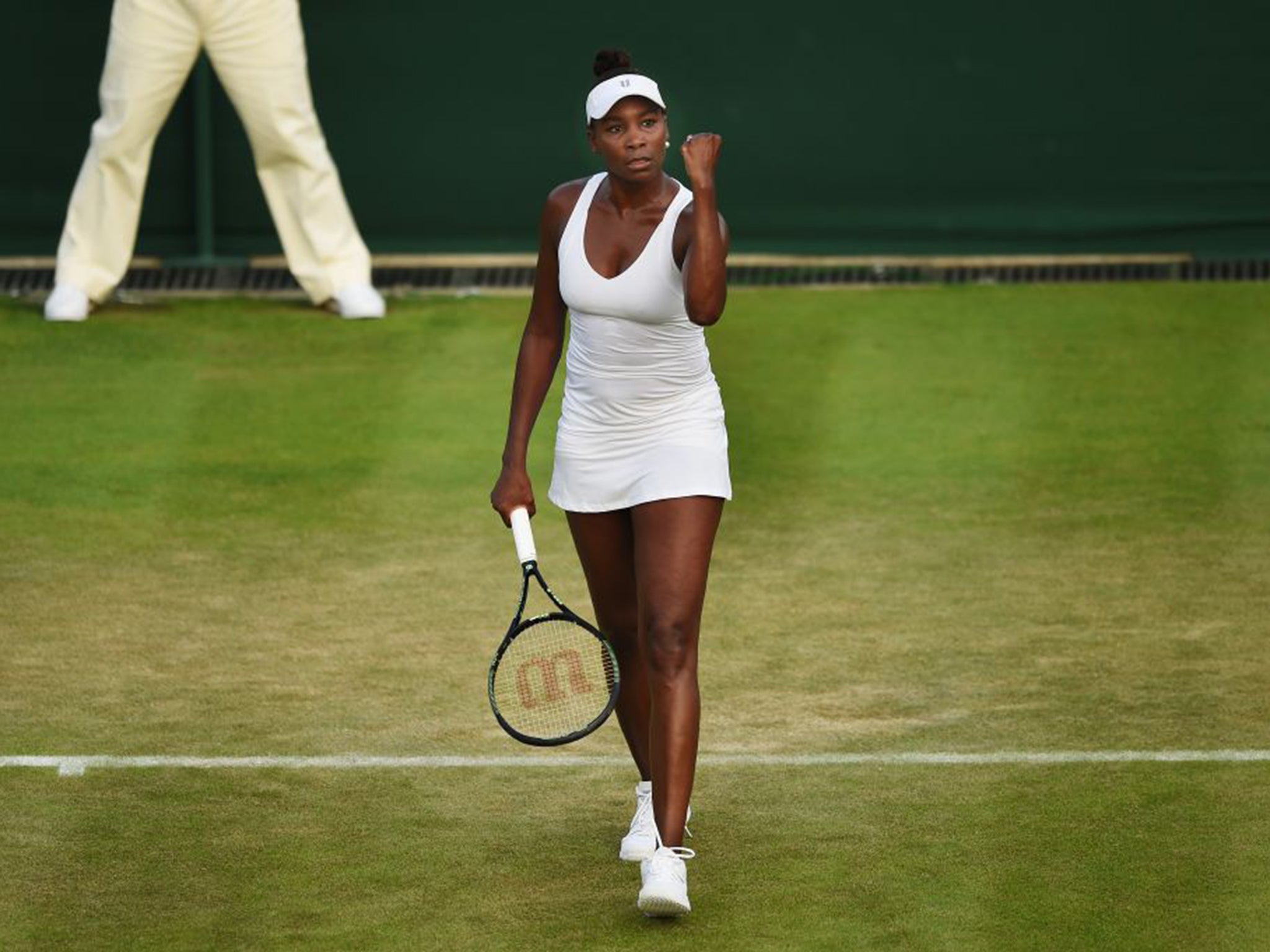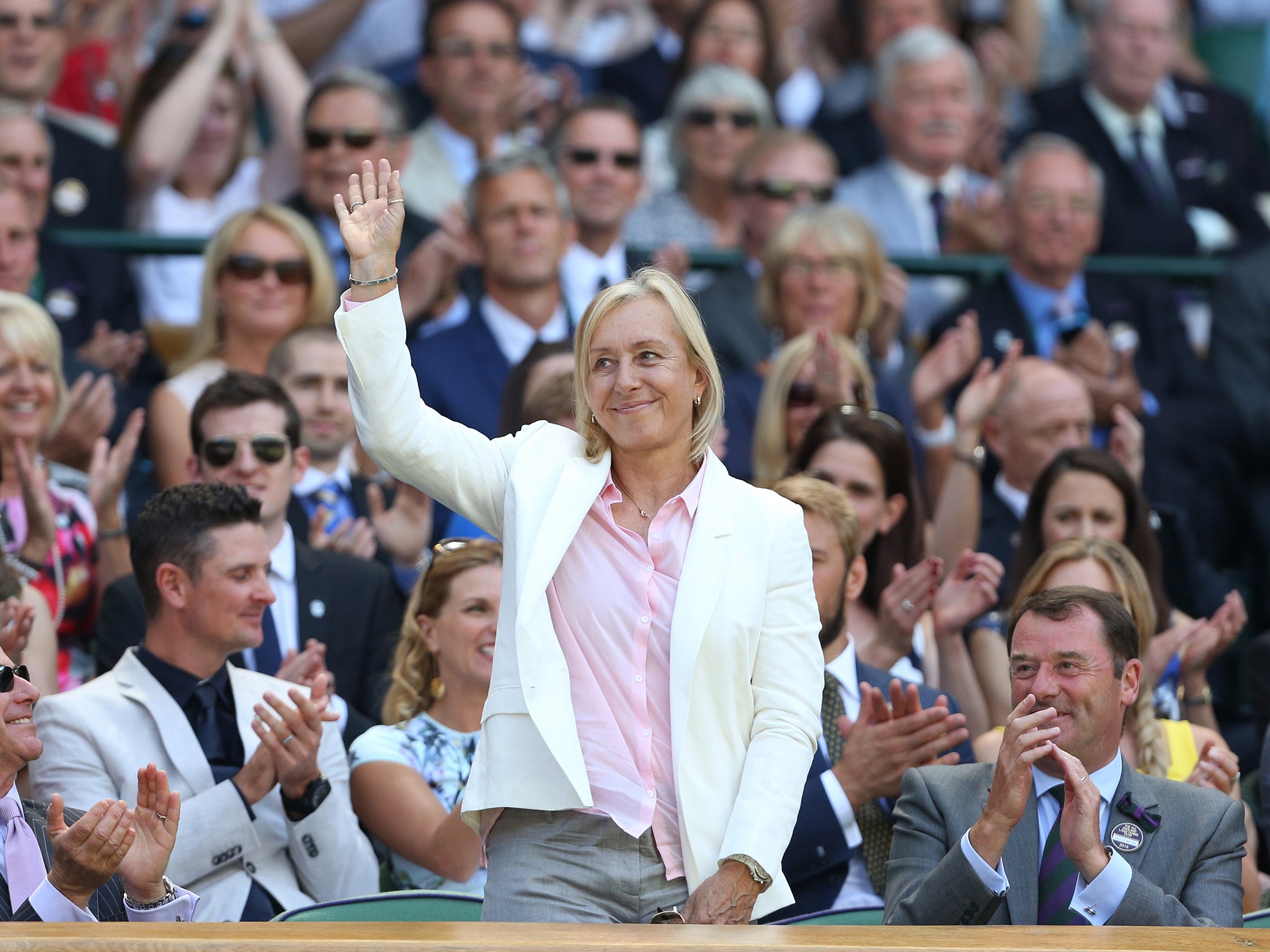Wimbledon 2015: 'Heather Watson has got to hold her head high,' says nine-times champion Martina Navratiolva
Martina Navratilova, the legendary nine-time champion, tells Sue Mott that an unfancied British woman has helped to prove her contention that Serena Williams is not invincible

There’s no rivalry in women’s tennis any more, they said. None at all given the thundering ascendancy of Serena “Slam” Williams on the cusp of winning her fourth major in a row.
No rivalry, it turned out, until an emboldened Heather Watson took leave of her British senses to come within two shuddering points of a Wimbledon all-time monumental upset. Cast in the role of steamrollered underdog she became – aptly this week – a Lioness instead.
One woman understood every nuance of the drama. Martina Nav-ratilova, was also that ascendant superstar. So dominant in her time that the flamboyant American tennis commentator, Bud Collins, reckoned she should be given a league of her own. While Williams is currently on a 24-game win streak, Navratilova’s lasted 74 games in 1984. Between 1982-86 she won 428 singles matches out of 442. Even her famous, toe-to-toe rivalry with Chris Evert had ebbed away by then.

If anyone can identify with Serena Williams, she can. Under normal circumstances, to play Serena is to enter the gladiatorial arena and find you are very much not the one with the trident. But this was a match that redefined our expectations of the women’s tennis pecking order.
The Centre Court crowd was uproarious, deafening and – good God – even impolite. They cheered the mistakes of the American world No 1 like an FA Cup Final goal.
Navratilova said: “Serena really should have won this match a lot more easily. At the same time she could have lost it 6-1 in the third. The nerves did get to her a little bit.
“It was a great effort from Heather. She has got to hold her head high.”
Coming from a nine-times Wimbledon champion, watching the match for the Tennis Channel, that was worthy praise.
Navratilova had been right all along. Despite fears that the spectacle of women’s tennis was being damaged by the all-conquering nature of Williams’ game, up comes one of the most riveting episodes ever. With a British woman too.
“Women’s tennis doesn’t have to do anything about it, not at all,” said Navratilova. “Serena’s just an exceptional athlete and player. The men’s game has a number of great players all around at the same time at the moment but in the women’s game –some retired, some haven’t stepped up yet – Serena just has no peer.
“It’s credit to Serena but I’m also disappointed nobody pushes her more. When I was her age Steffi Graf had already won the Grand Slam. Then it was Monica Seles who came through. Maybe it was just my bad luck. Without Steffi I’d probably have won 20 majors. And now there’s no Steffi pushing Serena.”
There was a fair bit of pushing from Watson, it turned out. In the end, Williams – a five-time Wimbledon champion – had precedent and the sheer physical sovereignty to prevail. That might sound familiar. Navratilova was the player who took the sport from cardigans to chain mail. Her assumption of fitness, muscle, aggression was the single most important redefinement of women’s tennis of the 20th century. That and losing the corsets back in the 1910s.
The Amazonian ferocity – if not the adherence to the baseline – of the current game owes so much of itself to her.
That is why one of the greatest moments in her career was winning her last Wimbledon in 1990, aged 33, when she knew her physical powers were waning. “The last one was very special because I worked really hard for it. I was beyond my sell-by date. Not really in age but in terms of how many matches I’d played. That’s what’s amazing about Serena Williams. She’s 33 now but she’s played about 400 fewer singles matches than I had at that age and probably about 400 fewer doubles matches too. I had a lot more wear and tear. Still it’s amazing what she’s doing.”
With that final victory she broke the record for Wimbledon singles titles and from that experienced vantage point, she very much reckons that Andy Murray could win this one – and more. “Oh absolutely, why not? He’s playing the best tennis of his life, according to him. He won here two years ago, so the pressure’s off and he’s already got two slams under his belt.
“He’s got three, maybe four, more years of physical prime. And there’s four majors a year. That’s 16 more shots at it, right?”
She also joins the growing chorus that credits Murray’s coach Amélie Mauresmo for this new-found formidability. “They like each other, they work well together and she’s made him more aggressive. He’s always had the tools, now he’s using them more. He has confidence in her. I’m happy for them. it’s great. Now maybe other guys won’t think about gender when they hire coaches.”
She does not rule out working with a male player in the future. “I’m not excluding it. I want to do it. But right now I have a lot on my plate. I’m a parent. I have two girls and a wife. That’s funny to say. I always wanted a wife but I’m a wife too. We’ve been partners for seven years and now we’ve been able to make it legal.”
She married Julia Lemigova at a ceremony in December with Chris Evert as a maid of honour, rivalry long since having morphed into abiding friendship.
It’s nearly 40 years ago now since her worst moment on a tennis court aged 19 – losing in the first round of the US Open in 1976, while Evert, incidentally, went on to crush Evonne Goolagong in the final in straight sets.
“I cried. I broke down on the court like a baby. I felt like a baby,” said Navratilova. “It was one year after defecting and I had played all summer long. I couldn’t go back to Czechoslovakia. I was absolutely exhausted and Janet Newberry beat me – the only match on that day because it had been raining so much. I felt extremely alone.”
“But it’s a lifetime ago now,” she said.
Martina Navratilova is a tennis expert and tournament commentator on BT Sport. BT Sport is the exclusive UK broadcaster of 21 live WTA events every year.
Join our commenting forum
Join thought-provoking conversations, follow other Independent readers and see their replies
Comments
Bookmark popover
Removed from bookmarks